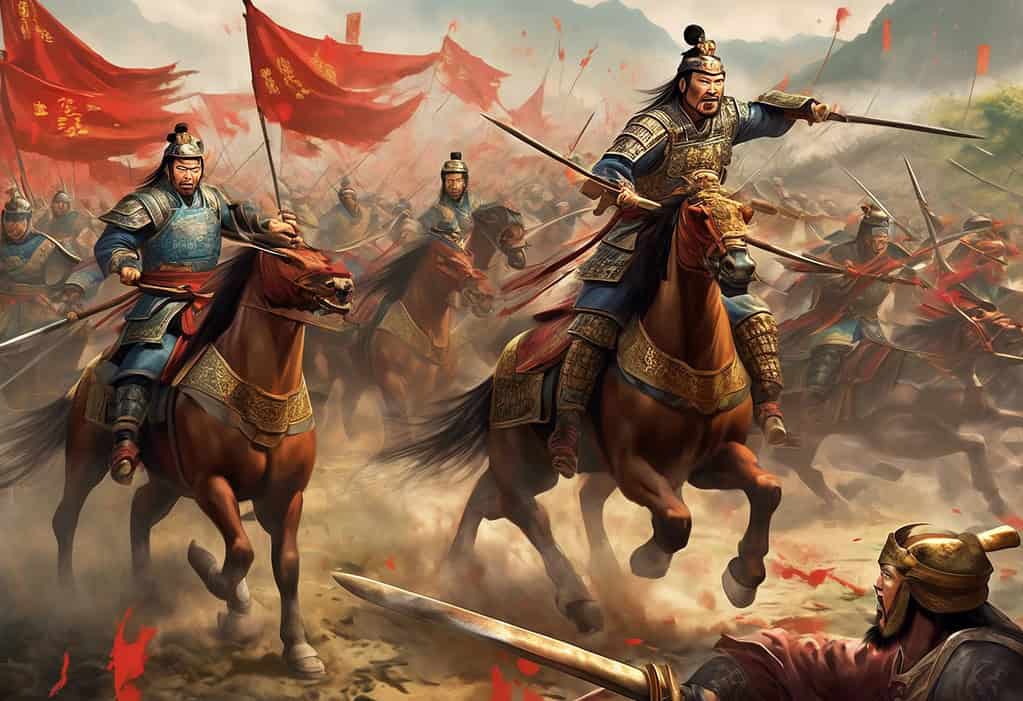The Three Kingdoms Period (220-280 CE) was a time of conflict in ancient China. It was a time of power struggles and battles between three rival states. These states were Wei, Shu, and Wu. Each state was led by a powerful warlord. The Three Kingdoms Period is considered a significant period in Chinese history. It had a lasting impact on the culture and politics of China. The period was marked by military campaigns, alliances, and betrayals. It eventually led to the reunification of China under the Jin Dynasty.
Summary List
- Three Kingdoms Period lasted from 220-280 CE
- It was a time of civil war and political turmoil in ancient China
- The period is named after the three major states that emerged: Wei, Shu, and Wu
- It was a time of great military strategies and famous battles, such as the Battle of Red Cliffs
- The period laid the foundation for the reunification of China under the Jin Dynasty
Games And Apps
Learning Modules
Battle of Wuzhang Plains (234 CE)
The Battle of Wuzhang Plains in 234 CE was a pivotal moment in Chinese history, as the forces of Shu Han and Cao Wei clashed in a fierce struggle for dominance. With strategic maneuvers, betrayal, and fierce combat, this battle would ultimately shape the future of the Three Kingdoms period.
I Want To Learn This!Cao Ren’s Defense of Hefei (234 CE)
In 234 CE, General Cao Ren mounted a valiant defense of Hefei against the overwhelming forces of Sun Quan's army. Despite being heavily outnumbered, Cao Ren's strategic brilliance and unwavering determination allowed him to hold off the enemy and secure a crucial victory for the Wei forces.
I Want To Learn This!Battle of Hefei (233 CE)
In 233 CE, the Battle of Hefei unfolded as the forces of the Kingdom of Wu clashed with the Kingdom of Wei in a fierce struggle for supremacy. With strategic maneuvers and daring tactics, both sides fought relentlessly for control, leading to a decisive turning point in the history of ancient China.
I Want To Learn This!Sun Quan Declares Himself Emperor of Eastern Wu (229 CE)
In 229 CE, Sun Quan, the ambitious leader of Eastern Wu, made a bold declaration by crowning himself Emperor. This significant moment marked the beginning of a new chapter in Chinese history, as Sun Quan solidified his power and established his dynasty in the tumultuous Three Kingdoms period.
I Want To Learn This!Zhuge Liang’s Northern Expeditions (228-234 CE)
Zhuge Liang, the brilliant strategist of the Three Kingdoms era, led a series of Northern Expeditions from 228 to 234 CE in an attempt to conquer the northern territories. Facing fierce opposition and harsh conditions, Zhuge Liang's campaigns showcased his tactical genius and determination in the face of adversity.
I Want To Learn This!Battle of Jieting (228 CE)
The Battle of Jieting in 228 CE was a pivotal conflict between the forces of Cao Cao and Ma Chao during the Three Kingdoms period in China. The battle showcased the strategic prowess of both generals and ultimately resulted in a decisive victory for Cao Cao's army.
I Want To Learn This!Cao Cao’s Southern Campaign (222 CE)
In 222 CE, the legendary Chinese warlord Cao Cao embarked on his Southern Campaign, aiming to conquer the southern regions of China. Facing fierce resistance from local warlords and rival factions, Cao Cao's military prowess and strategic brilliance would be put to the ultimate test in this pivotal campaign.
I Want To Learn This!Battle of Yiling (222 CE)
The Battle of Yiling in 222 CE was a pivotal moment in Chinese history, where the legendary strategist Zhuge Liang faced off against the warlord Sun Quan. With strategic brilliance and fierce determination, Zhuge Liang outmaneuvered his opponent to secure a decisive victory that shaped the future of the Three Kingdoms era.
I Want To Learn This!Liu Bei’s Declaration of the Restoration of Han Dynasty (221 CE)
In 221 CE, Liu Bei declared the restoration of the Han Dynasty, proclaiming himself as its rightful ruler. With a vision of unity and justice, he sought to bring stability and prosperity to a war-torn land. His declaration marked the beginning of a new era in Chinese history.
I Want To Learn This!Cao Pi’s Usurpation of the Han Throne (220 CE)
In 220 CE, Cao Pi seized power from the Han dynasty, marking the end of centuries of imperial rule. With cunning political maneuvers and military strength, he declared himself emperor, establishing the Wei dynasty. This pivotal moment in Chinese history would shape the future of the nation for centuries to come.
I Want To Learn This!Battle of Fancheng (219 CE)
The Battle of Fancheng in 219 CE was a pivotal conflict during the Three Kingdoms period of China. Led by the legendary general Cao Cao, the Wei forces successfully besieged the city of Fancheng, securing their dominance in the region. This battle marked a turning point in the power struggle between rival warlords.
I Want To Learn This!Battle of Mount Dingjun (219 CE)
In 219 CE, the Battle of Mount Dingjun was a pivotal clash during the Three Kingdoms period in China. Led by Guan Yu, the Shu forces faced off against the Wei army, culminating in a fierce and bloody struggle for control of the strategic mountain stronghold. The outcome would shape the course of history.
I Want To Learn This!Guan Yu’s Death at Maicheng (219 CE)
In the year 219 CE, the legendary warrior Guan Yu faced his final battle at Maicheng. Surrounded by enemies, Guan Yu fought fiercely to the end, earning admiration and respect from all who witnessed his bravery. His death marked the end of an era, leaving a legacy that would never be forgotten.
I Want To Learn This!Liu Bei’s Conquest of Yi Province (214 CE)
In 214 CE, Liu Bei launched a strategic campaign to conquer Yi Province, a pivotal region in his quest to unify China. With cunning tactics and fierce determination, Liu Bei fought against rival warlords to expand his territory and solidify his power in the turbulent Three Kingdoms era.
I Want To Learn This!Cao Pi Proclaims Himself Emperor of Wei (220 CE)
In 220 CE, Cao Pi boldly declared himself Emperor of Wei, marking the end of the Han dynasty and the beginning of a new era in Chinese history. With this proclamation, he solidified his power and set the stage for a period of political turmoil and conflict in the region.
I Want To Learn This!Battle of Xiaoting (221 CE)
The Battle of Xiaoting in 221 CE was a pivotal conflict between the forces of Liu Bei and Sun Quan, ultimately leading to the reunification of China under the Three Kingdoms. With strategic maneuvers and fierce combat, this battle proved to be a turning point in the history of ancient China.
I Want To Learn This!Battle of Red Cliffs (208 CE)
The Battle of Red Cliffs in 208 CE saw the forces of warlords Liu Bei and Sun Quan defeat the powerful army of Cao Cao in a pivotal battle during the Three Kingdoms period in ancient China. This historic clash changed the course of Chinese history and shaped the future of the region.
I Want To Learn This!Liu Bei’s Oath of the Peach Garden (208 CE)
In the year 208 CE, Liu Bei, Guan Yu, and Zhang Fei swore an oath of brotherhood in the Peach Garden, pledging to support each other in their quest for justice and righteousness. This legendary oath marked the beginning of their epic journey to unite China under the banner of the Three Kingdoms.
I Want To Learn This!Sun Quan’s Conquest of Jing Province (208 CE)
In 208 CE, Sun Quan, a prominent warlord in ancient China, launched a successful conquest of Jing Province, solidifying his power in the region. Through strategic alliances and military prowess, Sun Quan expanded his influence and laid the foundation for the future rise of the Kingdom of Wu.
I Want To Learn This!Sun Ce’s Conquest of Jiangdong (194-200 CE)
Sun Ce, a brilliant and ambitious warlord, rises to power in the chaos of the Three Kingdoms era. As he sets his sights on conquering the region of Jiangdong, he faces fierce resistance from rival warlords and must navigate treacherous political intrigue to achieve his ultimate goal of unifying the land under his rule.
I Want To Learn This!












